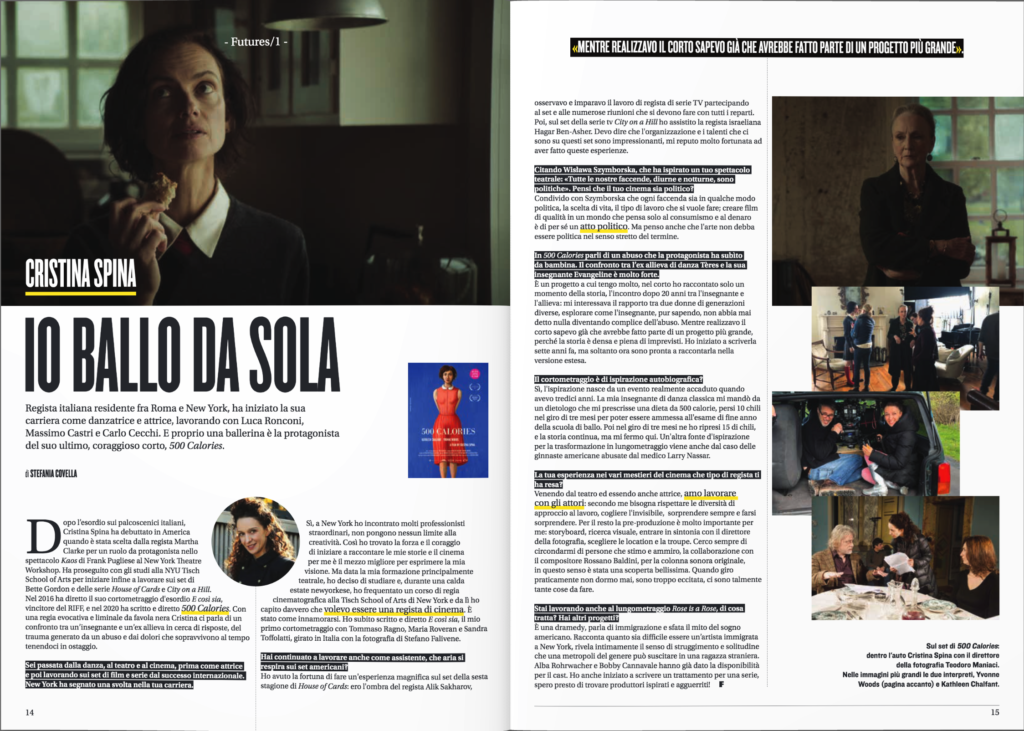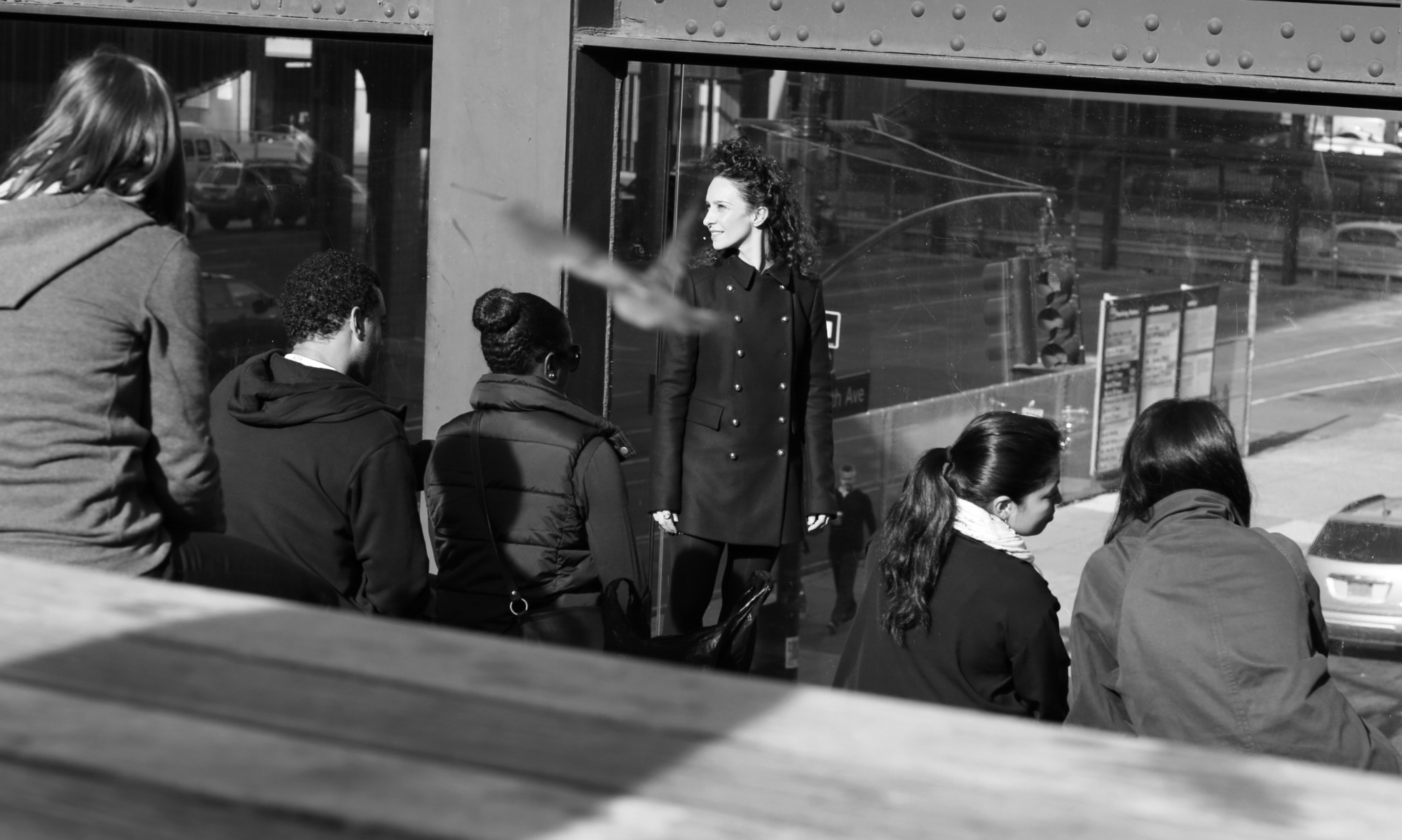“Accomplishing this divine coup de téâtre is an actress, Eleonora Della Rosa, modeled on the legendary and charismatic Eleonora Duse and played with fiery rage in this recent production by the supremely talented Cristina Spina. Spina’s the kind of actress you hope to see when you see an Off-Broadway play, especially one produced in affiliation with the estimable John Turturro. Easily filling every moment of stage time with pathos, rage, joy and cunning, she is a diva in the best sense of that word. Commanding our attention and then giving us more than we’d ever expect or ask for, Spina shines here as the brightest of stars, the zenith of our theatrical stratosphere.”
https://stagebuddy.com/theater/theater-review/review-imperfect-love 2018
In Imperfect Love we recognize the great Duse as the character Eleonora Della Rosa (in a fiery, humorous portrayal by Cristina Spina)
by Carole Di Tosti http://www.theaterpizzazz.com/imperfect-love/ 2018
Cristina Spina is an impassioned and worldly Elizabeth willing to fight off Parliament and suitors alike in her que “Cristina Spina is an impassioned and worldly Elizabeth willing to fight off Parliament and suitors alike in her quest to remain single. Whether in English or Italian, Spina gives us a strong monarch willing to stand her ground with intelligence and wit.”
Benjamin Tomchik, Broadway world.com 2015
“The vibrant Italian actress Cristina Spina is central to an overview section, which sums up some of Elizabeth’s approaches to ruling, including her refusal to get too involved in the era’s religious conflicts and her refusal to marry. Spina occasionally speaks in Italian, drawing attention to the fact that Elizabeth was an accomplished polyglot.”
Celia Wren, The Washington Post 2015
“…Cristina Spina is an actress both delicate and determined. She’s a slight creature with a moral and poetic power that seduces. She’s a young artist who identifies the beauty of being human and being the target of adverse misfortunes…”
Rodolfo Di Giammarco, La Repubblica 2013
“…Cristina Spina, excellent actress with a physicality as candid as it is precise, “…Cristina Spina, excellent actress with a physicality as candid as it is precise, offers us “My Name is Rachel Corrie” with the lightness of a sketch, and yet confers it the weight of a marble cast…”
Gianfranco Capitta, Manifesto 2012
“…Cristina Spina (actress and director), with the co-direction of Alessandro Fabrizi, gifts us a brief yet intense glimpse into the life of a passionate and determined woman, who always observed reality with a critical mind and wide eyes. Spina’s performance is both beautiful and genuinely moving, full of delicate, poetic and poignant touches that never ask for pity…”
Federica Riano, Teatro.org 2012
“…The credit belongs to Cristina Spina, who humbly gives Rachel Corrie back her voice, and who was at length and justly applauded by a large audience…”
Franco Cordelli, Corriere Della Sera 2009
“…As an artist, she was adopted by Castri, Ronconi and Cecchi, yet always remained elusive and independent. She’s Rimini-born but rooted in Rome, except for her current stay in New York. She’s an actress, but has a penchant towards dance, art and poetry. She’s experienced in crowded undertakings but is also a soloist by choice. Despite being reserved and composed, she first reached fame while fully naked in Pasolini’ “Orgy” directed by Castri, and was able to splendidly recite a poem by Nobel Prize winner Szymborska with her legs up in the air and her head upside down. Her intrusive and surreal body is actually petite in real life, 5” 2’ in height. She’s a constantly fleeing creature who has earned praise for her “radiant stigmata, like an Eleonora Duse” in her “Play of Saint Uliva” at the Academy. Then, shortly afterwards, Cristina Spina worked with Castri in “Orestes”, Goldoni’s “The Holiday Trilogy” and again “Orgy.” Ronconi then called her for “That Terrible Mess in Via Merulana” and “Il Candelaio.” She then gained experience with Shakespeare with Cecchi, not forgetting “Hecubas” with Irene Papas. Recently, she produced “An Instant Life” a velvety, civilized monologue from verses by Szymborska. The monologue features Cristina Spina dialoguing with sections of an oversized feminine sculpture of Paola Gandolfi – as beautiful as a figurehead. Dynamic and contemplative, Spina holds dear the language of shapes, and has a weakness for totem-like portrayals. “I adore the men and women made colossal or miniaturized by Ron Mueck, and Kiki Smith’s oversized human installations. They shape our truths as we find them within us”…”
Rodolfo di Giammarco, La Repubblica 2007

